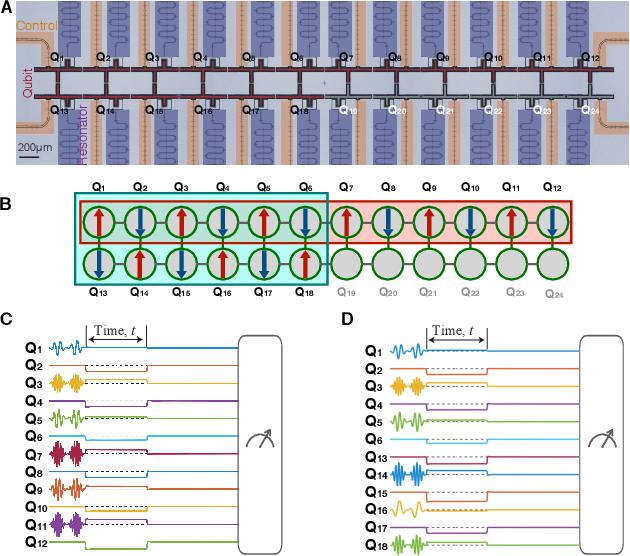In recent years, physicists have carried out extensive studies focusing on quantum technology and quantum many-body systems. Two out-of-equilibrium dynamical processes that have attracted particular attention in this field are quantum thermalization and information scrambling.
Thermalization, or "the relaxation to equilibrium," is a process through which quantum many-body systems achieve thermal equilibrium. Information scrambling, on the other hand, entails the scattering of local information into many-body quantum entanglements, which are distributed throughout a quantum many-body system.
Researchers at the University of Science and Technology of China, the Shanghai Research Center for Quantum Sciences, and the Chinese Academy of Sciences have recently observed both thermalization and information scrambling in a superconducting quantum processor. Their findings, published in a paper in Physical Review Letters, could pave the way towards new studies focusing on the thermodynamics of quantum many-body systems.
"The non-equilibrium properties of quantum many-body systems is relevant to whether the integrability of the quantum system is broken," Xiaobo Zhu, one of the researchers who carried out the study, told Phys.org. "Specifically, thermalization and information scrambling fail during non-equilibrium dynamics of the one-dimensional free fermions as an integrable system."
Experimentally investigating thermalization and information scrambling in both integrable and non-integrable quantum systems can be particularly challenging, for two key reasons. Firstly, doing this requires the experimental implementation of both these type of systems on the same quantum simulator.
In addition, to successfully conduct these experiments researchers need to be able to collect accurate and efficient measurements of entanglement entropy and tripartite mutual information. These measurements ultimately allow scientists to quantify thermalization and information scrambling, respectively, typically using an approach known as multi-qubit quantum state tomography.

"In our recent work, using a programmable ladder-type superconducting circuit consisting of 24 qubits, we experimentally studied thermalization and scrambling in the 12-qubit chain and ladder, performing quantum simulations of the 1D XX model, which can be mapped to free fermions, a typical integrable system, and the XX-ladder model as a non-integrable system," Zhu explained. "We observed two distinct dynamical behaviors of the qubit array chain and ladder, demonstrating that integrability plays a key role in thermalization and information scrambling."
Zhu and his colleagues decided to study quantum thermalization and information scrambling in a superconducting quantum processor characterized by a high programmability. By tuning all qubits to the same interacting frequencies, they were able to experimentally study the non-equilibrium dynamics of the qubit chain and ladder.
"After the time evolution, we can measure the local observables by projecting all qubits to the Z projections," Zhu said. "We also used high-precision multi-qubit quantum state tomography to measure the entanglement entropy and the tripartite mutual information (TMI). The ladder-type architecture of the superconducting circuit allowed us to study the integrable 1D chain and the non-integrable ladder in the same quantum processor."
Zhu and his colleagues first investigated thermalization and information scrambling in their highly programmable superconducting circuit's qubit array chain and ladder. Their observations suggest that integrability significantly impacts the properties of out-of-equilibrium quantum many-body systems.
"We also observed a stable negative value of TMI in the non-integrable system, which is the first experimental signature of information scrambling, characterized via TMI, laying down the foundation for further experimental studies on TMI in other platforms," Zhu said.
In addition to gathering interesting insight about the relevance of a system's integrability in determining its out-of-equilibrium properties and unveiling a signature of information scrambling, Zhu and his colleagues were among the first to study quantum many-body systems using a highly programmable quantum processor.
In the future, the size of the circuit they used could be expanded further, to carry out computations that would be harder to perform using classical computers. In their next studies, the researchers would like to expand on their recent work, pursuing two main research directions.
"Firstly, we plan to include more qubits to form a larger many-body system," Zhu added. "Secondly, we plan to improve the programmability of the quantum processor. On the state-of-the-art superconducting quantum processor 'Zuchongzhi 2.0', we have successfully demonstrated the quantum advantage. We plan to use this processor to demonstrate more exciting phenomena in many-body physics."
Explore further
First hybrid quantum bit based on topological insulatorsMore information:Qingling Zhu et al, Observation of Thermalization and Information Scrambling in a Superconducting Quantum Processor, Physical Review Letters (2022).DOI: 10.1103/PhysRevLett.128.160502Journal information:
© 2022 Science X Network
Citation: Thermalization and information scrambling in a superconducting quantum processor (2022, May 19) retrieved 19 May 2022 from https://phys.org/news/2022-05-thermalization-scrambling-superconducting-quantum-processor.htmlThis document is subject to copyright. Apart from any fair dealing for the purpose of private study or research, nopart may be reproduced without the written permission. The content is provided for information purposes only.



